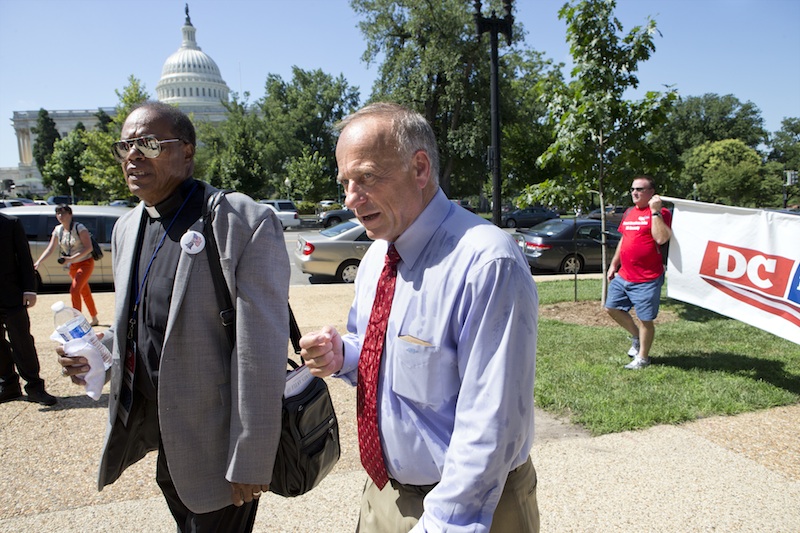Immigration advocates are increasingly anxious and vowing to engage in nonviolent civil disobedience as Republicans reaffirm their defiant tone against President Barack Obama’s call for reviving the stalled overhaul effort.
“We are in full escalation mode,” Greisa Martinez, an organizer of the pro-reform United We Dream, told reporters on a conference call Friday. “We want the House GOP to know we will not let up the pressure on them … We are asking that they stop obstructing the progress on immigration reform.”
The signs are piling up that the GOP House majority will run out the clock as reform withers on the vine. Republican leaders have forcefully rejected the sweeping legislation passed by the Senate on a broad bipartisan vote this summer, and have said they’d chart out a step-by-step course of their own. But they have no plans to vote on immigration bills this year and no internal consensus on how they should proceed.
“We either have a path to citizenship or a path to hell,” said Maria Rodriguez, the executive director of the Florida Immigrant Coalition. She said her organization intends to hold “sit ins, praying, fasting, protesting” to draw attention to the cause. “They’re running out of excuses and we’re running out of time. … The hell that immigrant communities are living in is not really coming through.”
In a televised speech Thursday at the White House, Obama said it’s “up to Republicans in the House to decide whether reform becomes a reality or not … It doesn’t get easier to just put it off. Let’s do it now. Let’s not delay. Let’s get this done, and let’s do it in a bipartisan fashion.” He rattled off the broad coalition behind comprehensive reform, which includes business, labor, evangelicals, Democrats “and many Republicans.”
Speaker John Boehner (R-OH) didn’t respond to Obama’s remarks. He has deferred to Judiciary Chairman Bob Goodlatte (R-VA), who questioned the president’s sincerity and repeatedly compared the Senate-passed bill to Obamacare — the ultimate conservative insult.
“I hope President Obama meant what he said today about listening to new and different ideas presented by House Republicans to improve our immigration system because House Republicans and the American public have rejected the Senate approach,” Goodlatte said. “Our immigration system is in desperate need of reform and I remain committed to working on this critical issue. But we don’t need another massive, Obamacare-like bill that is full of surprises and dysfunction after it becomes law. … The President should work with Congress, including House Republicans, to achieve immigration reform and not against us.”
That’s the public GOP stance, but it masks a far more grim reality. “After Obama poisoned the well in the fiscal showdown and [House Minority Leader Nancy] Pelosi now is actively trying to use immigration as a political weapon, the chances for substantive reforms, unfortunately, seem all but gone,” a pro-immigration conservative GOP operative anonymously told Politico.
Boehner is torn between protecting his GOP members against potential conservative primary challengers, on one hand, and preserving his party’s viability with the general electorate in the medium-term. The two imperatives are contradictory because the Republican base opposes leniency for people living in the country illegally. Making matters worse, the Speaker would be hard-pressed to force his members to take a difficult vote ahead of the upcoming Jan. 15 government funding deadline and Feb. 7 debt limit deadline.
Boehner’s deputy chief of staff, David Schnittger, reaffirmed that a comprehensive bill won’t fly in the House. “[D]oes nearly everyone support doing it the way the Senate did it? A single massive bill few understand? Not even close,” he told TPM on Twitter, instead vouching for a “step-by-step approach Americans favor and is necessary to pass the House.”
Even Sen. Marco Rubio (R-FL), who made a big political gamble by supporting reform, now says the prospects are bleak after the heated debate that led to a government shutdown and near-breach of the debt ceiling. “Absolutely, the president has undermined these efforts,” he said last Sunday on Fox News. “I certainly think that immigration reform is a lot harder to achieve today and it was just three weeks ago because of what’s happened here.”
Rubio sympathized with Rep. Raul Labrador (R-ID), who argued last week it’d be “crazy” for Republicans to negotiate with Obama on immigration because he simply wants to use the issue to “destroy” the party. “You’re going to pass a legalization law and some enforcement,” Rubio posited. “What’s not to say that this White House won’t come back and cancel the enforcement aspects of it? And that’s what he means by lack of trust, and quite frankly, it’s difficult to find a good answer to that. I think they make a very legitimate point.”
Advocates are eager to complete reform this year because House Republicans will be less likely to compromise when primary elections begin early in 2014. “It’s too early to start thinking about 2014,” said Lynn Tramonte, the deputy director of America’s Voice. “We’re very focused on 2013 and I don’t think that’s naive. I think that’s exactly where we need to be.”
The narrow path to success requires the House to pass piecemeal immigration bills addressing border security, legal immigration and a legalization component for people living in the U.S. illegally — and then go to conference with the Senate. One key obstacle, among others, is that conservatives against any form of “amnesty” are demanding GOP leaders slam the door shut on conference, fearing that they’ll be marginalized in negotiations.
If Republicans end up killing reform, it’s in their political interest to do so as slowly and quietly as possible, establishing a rationale for refusing to advance the issue ahead of time so they’re prepared for the fallout. The time of death won’t be known; the patient will be left alone on life support for months until the inevitable — and unsurprising — flat-line.
“Time is running out,” said Reyna Montoya, the Arizona organizer of United We Dream.






